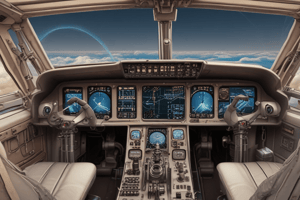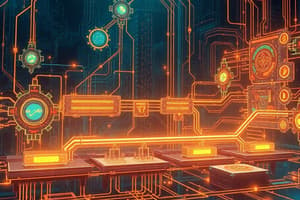Podcast
Questions and Answers
What type of system uses an output measurement to compare with the desired output?
What type of system uses an output measurement to compare with the desired output?
- Open-loop system
- Automation system
- Close-loop system (correct)
- Control system
Which term refers to the gap between the physical system and the design model?
Which term refers to the gap between the physical system and the design model?
- Feedback signal
- Time constant
- Trade-Off
- Design Gap (correct)
What is the term for a measure that reflects how quickly a first-order system responds to a unit step input?
What is the term for a measure that reflects how quickly a first-order system responds to a unit step input?
- Steady-state response
- Time constant (correct)
- Automation
- Productivity
What does adjusting parameters or designing components achieve in a control system?
What does adjusting parameters or designing components achieve in a control system?
In control systems, what is a feedback signal used for?
In control systems, what is a feedback signal used for?
Which of the following describes a configuration where the control action is independent of the output?
Which of the following describes a configuration where the control action is independent of the output?
What is the simplest form of a block diagram?
What is the simplest form of a block diagram?
What is the term for unintended consequences arising from design uncertainties?
What is the term for unintended consequences arising from design uncertainties?
What is the name given to a system with more than one input variable or more than one output variable?
What is the name given to a system with more than one input variable or more than one output variable?
Which property is essential for closed-loop control systems?
Which property is essential for closed-loop control systems?
What term is used to describe the control of an industrial process by automatic means?
What term is used to describe the control of an industrial process by automatic means?
Control engineers primarily focus on managing what?
Control engineers primarily focus on managing what?
What is the main purpose of analysis in systems analysis and design?
What is the main purpose of analysis in systems analysis and design?
What characterizes an open-loop control system?
What characterizes an open-loop control system?
What does the term 'controlled variable' refer to in a control system?
What does the term 'controlled variable' refer to in a control system?
In the context of transient response, what might happen if the system responds too quickly?
In the context of transient response, what might happen if the system responds too quickly?
Who is credited with inventing the clepsydra, an early control system?
Who is credited with inventing the clepsydra, an early control system?
What innovation during the Industrial Revolution significantly improved steam engine operation?
What innovation during the Industrial Revolution significantly improved steam engine operation?
What is the combined total response of a system composed of?
What is the combined total response of a system composed of?
Which of the following systems typically involves automatic control with minimal manual input?
Which of the following systems typically involves automatic control with minimal manual input?
Which of the following is NOT a major objective of systems analysis and design?
Which of the following is NOT a major objective of systems analysis and design?
What role does the output transducer play in a control system?
What role does the output transducer play in a control system?
What is the purpose of designing corrective actions in systems analysis?
What is the purpose of designing corrective actions in systems analysis?
What describes the 'natural response' of a system?
What describes the 'natural response' of a system?
What is the inverse transform of the function $F(s) = \frac{s + 6}{(s + 1)(s + 2)}$?
What is the inverse transform of the function $F(s) = \frac{s + 6}{(s + 1)(s + 2)}$?
Which of the following best describes Proportional Control?
Which of the following best describes Proportional Control?
In the context of feedback control, what is the primary objective?
In the context of feedback control, what is the primary objective?
For which situation is On-Off Control most suitable?
For which situation is On-Off Control most suitable?
What causes the difference between the measured value and the desired value in feedback control?
What causes the difference between the measured value and the desired value in feedback control?
Which of the following is NOT a common transform pair?
Which of the following is NOT a common transform pair?
Which type of control attempts to outperform On-Off Control?
Which type of control attempts to outperform On-Off Control?
In feedback control, what is meant by 'set point'?
In feedback control, what is meant by 'set point'?
What is the main function of the controlled variable in a control system?
What is the main function of the controlled variable in a control system?
Which of the following describes an external disturbance in a control system?
Which of the following describes an external disturbance in a control system?
In an open-loop control system, what is the relationship between output and control action?
In an open-loop control system, what is the relationship between output and control action?
What differentiates automatic control systems from manual control systems?
What differentiates automatic control systems from manual control systems?
What is classified as a manipulated variable in a control system?
What is classified as a manipulated variable in a control system?
How does an automatic washing machine exemplify an open-loop control system?
How does an automatic washing machine exemplify an open-loop control system?
Which type of control system would you associate with regulating room temperature using an air conditioner?
Which type of control system would you associate with regulating room temperature using an air conditioner?
What is a primary characteristic of disturbances in control systems?
What is a primary characteristic of disturbances in control systems?
What is the primary goal of the natural response in a control system?
What is the primary goal of the natural response in a control system?
Which of the following factors should be considered early in the design of a control system?
Which of the following factors should be considered early in the design of a control system?
What does a transfer function represent in a control system?
What does a transfer function represent in a control system?
In the design process, which step involves creating a functional block diagram?
In the design process, which step involves creating a functional block diagram?
What do Kirchhoff's laws assist with in the context of control systems?
What do Kirchhoff's laws assist with in the context of control systems?
What is necessary for a system to remain controlled regarding the forced response?
What is necessary for a system to remain controlled regarding the forced response?
Which of the following describes the objective of robust design in engineering?
Which of the following describes the objective of robust design in engineering?
What does the analysis and design phase in the control system design process primarily evaluate?
What does the analysis and design phase in the control system design process primarily evaluate?
Flashcards
Closed-loop system
Closed-loop system
A system that automatically adjusts its behavior based on the difference between its current output and a desired setpoint.
Adjusting parameters or designing components
Adjusting parameters or designing components
The process of altering parameters or designing new components to achieve the desired transient response in a system.
Feedback signal
Feedback signal
Any signal that reports the output of a system and is used to control its behavior.
Trade-off
Trade-off
Signup and view all the flashcards
Design gap
Design gap
Signup and view all the flashcards
Control System
Control System
Signup and view all the flashcards
Block diagram
Block diagram
Signup and view all the flashcards
Productivity
Productivity
Signup and view all the flashcards
Disturbance
Disturbance
Signup and view all the flashcards
Steady-State Response
Steady-State Response
Signup and view all the flashcards
Natural Response
Natural Response
Signup and view all the flashcards
System Analysis
System Analysis
Signup and view all the flashcards
System Design
System Design
Signup and view all the flashcards
Stability
Stability
Signup and view all the flashcards
Total Response
Total Response
Signup and view all the flashcards
Actuating Signal
Actuating Signal
Signup and view all the flashcards
Forced Response
Forced Response
Signup and view all the flashcards
Well-Controlled System
Well-Controlled System
Signup and view all the flashcards
Robust Design
Robust Design
Signup and view all the flashcards
Transfer Function
Transfer Function
Signup and view all the flashcards
State-Space Representation
State-Space Representation
Signup and view all the flashcards
Hardware Selection
Hardware Selection
Signup and view all the flashcards
System Definition
System Definition
Signup and view all the flashcards
Multivariable Control System
Multivariable Control System
Signup and view all the flashcards
Closed-loop Control System
Closed-loop Control System
Signup and view all the flashcards
Open-loop Control System
Open-loop Control System
Signup and view all the flashcards
Automation
Automation
Signup and view all the flashcards
System (in Control Engineering)
System (in Control Engineering)
Signup and view all the flashcards
Control Engineering
Control Engineering
Signup and view all the flashcards
Actuating Device
Actuating Device
Signup and view all the flashcards
Regulation (in Control Systems)
Regulation (in Control Systems)
Signup and view all the flashcards
Process
Process
Signup and view all the flashcards
Controlled Variable
Controlled Variable
Signup and view all the flashcards
Manipulated Variable
Manipulated Variable
Signup and view all the flashcards
Setpoint
Setpoint
Signup and view all the flashcards
Inverse Laplace Transform
Inverse Laplace Transform
Signup and view all the flashcards
Feedback Control
Feedback Control
Signup and view all the flashcards
On-Off Control
On-Off Control
Signup and view all the flashcards
Proportional Control
Proportional Control
Signup and view all the flashcards
Closed-Loop Control
Closed-Loop Control
Signup and view all the flashcards
Feedback Control System
Feedback Control System
Signup and view all the flashcards
Noise
Noise
Signup and view all the flashcards
Study Notes
Control Systems
- A system that uses a measurement of the output and compares it to the desired output is a closed-loop system.
- Tuning parameters or components is required to achieve the desired transient response.
- A measurement of the system's output used for feedback to control the system is called a feedback signal.
- Trade-offs are made between conflicting criteria during system design.
- A difference between the complex physical system and the design model is the design gap.
- A system where the control action is dependent on the output is a control system.
- A shorthand, graphical representation of a physical system illustrating functional relationships between components is a block diagram.
- The ratio of physical output to physical input in an industrial process is productivity.
- Risk refers to uncertainties in unintended consequences of a design.
- A measure of how quickly a first-order system responds to input is the time constant.
- The input to a system is sometimes called the reference.
- To reduce steady-state error, analysis and corrective actions are employed.
- The simplest form of a block diagram is a single block.
- Automatic control of an industrial process is called automation.
- A system where the control action is independent of the output is an open-loop system.
- System components are the elements of a system.
- An output transducer measures the output and converts it into a usable form for the controller.
- A system with multiple input or output variables is a multivariable system.
- A steady-state response is the output that remains after the transients have decayed.
- Stability is needed for a system to function effectively.
- Analysis of a system determines performance.
- Design for a system involves achieving desired performance.
- Natural response describes how a system dissipates or acquires energy.
- Forced response depends on the input to a system.
- Control Systems are required for power amplification, remote control, convenience of input, and disturbance compensation.
- Open-loop systems are simple and economical, but usually inaccurate and unreliable. They don't use feedback from the output.
- Closed-loop systems are more accurate and reliable, but more complex and expensive. They use feedback from the output.
System Configuration
- Open-loop systems have control actions independent of the output.
- Closed-loop systems have control actions dependent on the output.
- Control systems have input transducers, controllers, processes, and output transducers.
Analysis and Design
- Analysis determines a system's performance.
- Design establishes a system's performance.
- A control system is dynamic, responding to input with transient and steady-state responses.
- Objectives for systems analysis and design include producing the desired transient response, minimizing steady-state error, and assuring stability. These objectives often need compromises.
- The transient response occurs before the steady state is reached.
- Steady-state response is the output that remains after transients have decayed.
Stability
- System stability is critical.
- The total response is a combination of natural and forced responses.
- Natural response describes how the internal energy of the system dissipates or is acquired.
- Forced response depends exclusively on the input.
- Systems must exhibit natural response that approaches zero if the forced response is maintained.
- Control system design requires the considerations of factors that affect hardware selection, costing, and achieving robust design. Robust designs don't rely on specific parameter values.
Feedback Control Systems
- Feedback control systems compare actual output and reference, computing an error signal, to adjust the controlled output to match the reference.
- Feedback can be either positive or negative.
Laplace Transform
- Laplace transform converts differential equations into algebraic equations, simplifying solution.
- The Laplace transform of a sum is the sum of the transforms.
- The Laplace transform of a product is NOT the product of the transforms.
- Common transform pairs are used to recognize and solve inverse transform problems.
Block Diagram Simplification
- Blocks in series are multiplied to achieve an equivalent transfer function.
- Parallel blocks are added to get the equivalent.
- Feedback loops are manipulated to achieve a simplified equivalent transfer function.
P, PI, PD, PID Controllers
- A proportional controller adjusts the control action in proportion to the error signal.
- An integral controller integrates past errors to reduce steady state error.
- A derivative controller considers the rate of change of the error to improve stability and response speed.
- A PID controller combines P, I, and D controllers to offer robust performance and stability.
Control of 1st and 2nd Order Systems
- Transfer functions and steady-state error are key considerations as these are affected by gain adjustments.
Studying That Suits You
Use AI to generate personalized quizzes and flashcards to suit your learning preferences.




